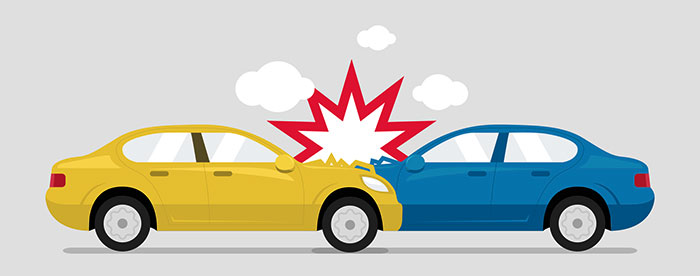Calm and Focused: How to Handle an Auto Collision
According to the National Safety Council, there were more than 11.3 million motor vehicle collisions in 2020 (most recent data available). Fortunately, only about 0.3% of these crashes involved a fatality. About 29% of crashes involved injuries, and the rest involved property damage only.1

Even a minor auto collision can be stressful and hazardous, so it’s important to stay as calm and focused as possible after an accident. This may help prevent further injury and enable you to collect the information you might need for an insurance claim. Here are some things you should try to remember if you are involved in a collision.
Roadside Guidelines
- Quickly move cars to the side of the road and out of the way of traffic, and turn on hazard lights to alert oncoming drivers. Use emergency flares if you have them. Check to see whether there are any injuries that require immediate medical attention and call 911 if help is needed. Police may stop to assist when passing the scene, but they might not respond to a call if there are no injuries or other issues requiring a police presence.
- If other drivers are involved, exchange information, including names, addresses, phone numbers, driver’s license numbers, license plate numbers, the name of each vehicle’s registered owner, and names of insurance companies and auto policy numbers. Do not discuss who is at fault or the limits of your insurance coverage. Ask for name and contact information from any witnesses. Obtain all necessary information even if no one appears to be hurt or the vehicle damage seems minimal.
- Record the make, model, color, and condition of the cars involved, as well as where and how the accident occurred. If it is safe to do so, take pictures at the site. The camera feature on most cell phones makes it easy to do this, but no photo is worth endangering yourself or others.
- If your car needs to be towed or you have questions about what to do next, call your insurance company from the scene of the accident. Most companies have specific numbers for this purpose, typically found on the insurance card you should carry with you. The company representative may call a tow truck for you and/or give you a list of approved towing companies.
- File an accident report with the insurance company as soon as possible. Depending on the company and insurance agent, you may be able to file the report by phone, in person, or through the company’s website or mobile phone app.
- File an accident report with the police or your state’s Department of Motor Vehicles. A form may be posted on the DMV website. Specific requirements vary by state.
Know Before You Tow
If your car is involved in an accident or breakdown and stranded on the side of the road, it’s natural to be in a hurry to have it towed — but proceed with caution. Unfortunately, there are dishonest towing service operators who may try to take advantage of your situation. It’s generally not a good idea to allow your car to be towed by an operator who appears on the scene without being called.
Optional towing coverage through your insurer pays for roadside assistance if your automobile is not drivable from the scene of an accident, but policies typically limit the amount of coverage. You could find yourself responsible for hundreds of extra dollars if you allow your car to be towed by a company that charges higher fees or allow your car to be towed a greater distance than is necessary.
The wisest approach may be to have your insurance company call the towing service for you, or you can call a provider recommended by the company. An approved towing operator may be able to bill the insurance company directly. Even if you do not pay at the time of service, ask for identification and be sure the towing service is the same one that you or the insurance company called. Carefully read the towing order or invoice, which should include specific charges and the address where your vehicle is being towed. Ask about estimated miles to the location and any mileage charges that may apply. Request to see a printed price list that includes daily storage fees and any other charges.
Accidents happen, even to the best drivers. But if you know the specifics of your coverage and carry your policy information in your car, you might be better prepared to handle a difficult situation. If you have questions about your towing coverage or the steps to take in the event of an accident, contact your auto insurance representative.
